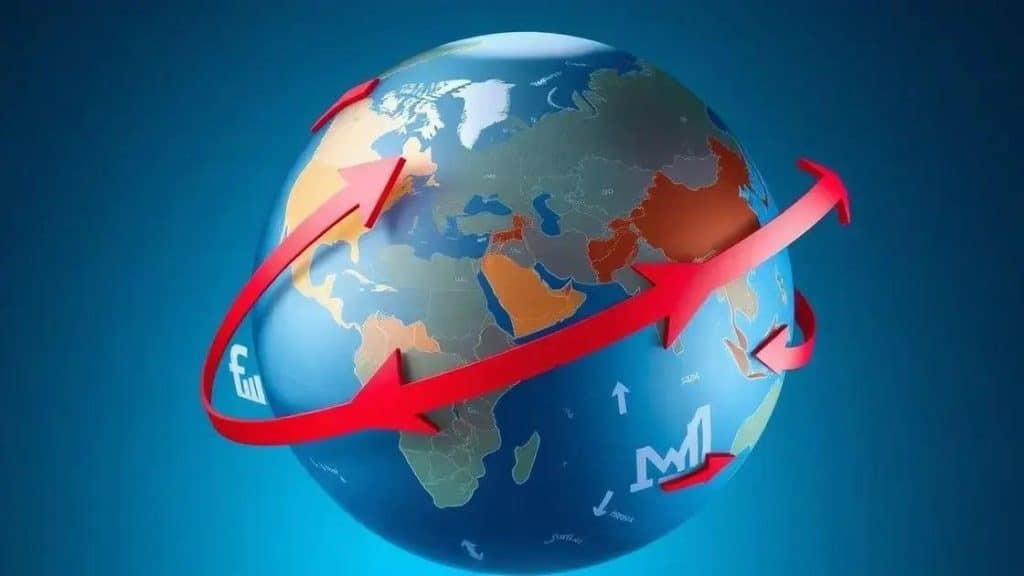Impacts of international trade wars on global economy

The impacts of international trade wars on the global economy include higher prices for consumers, disrupted supply chains, and significant economic consequences that influence government policies and business strategies.
Impacts of international trade wars on global economy can’t be overstated. Have you ever wondered how these conflicts shape our daily lives and global markets? In this article, we’ll dive into these impacts and their wider implications.
Understanding trade wars and their origins
Understanding trade wars and their origins is crucial in grasping their effects on the global economy. Trade wars can arise when countries impose tariffs or other trade barriers on each other. This often happens in response to perceived unfair trade practices. Economic competition between nations can lead to increased tensions and, ultimately, conflict.
What are Trade Wars?
A trade war usually begins when one country decides to impose tariffs on imports from another. This action may be taken to protect local industries or respond to unfair trade practices. Other countries may retaliate, creating a cycle of escalating tariffs.
- Tariffs are taxes on imports.
- Retaliatory measures can lead to higher prices.
- Global supply chains are often disrupted.
- Consumers may end up paying more.
Trade wars can significantly affect various sectors. For example, agricultural producers may find their products facing higher tariffs abroad. This situation can lead to lower exports and affect farmers’ incomes. Similarly, manufacturers that rely on imported materials may see increased costs.
Origins of Trade Wars
The origins of trade wars often involve complex economic and political factors. Countries may feel that their interests are being threatened by others. For instance, a nation might believe that unfair pricing or subsidies harm its businesses. In some cases, trade policies are part of broader geopolitical strategies.
Public opinion can also play a role in the escalation of trade tensions. Leaders often respond to the concerns of their citizens about jobs and economic stability. This can lead to actions aimed at protecting local industries, which may inadvertently trigger trade disputes.
Ultimately, understanding trade wars requires a close look at the interplay between economics and politics. By recognizing the factors that contribute to these conflicts, individuals can better assess their implications. In today’s interconnected world, the impacts of these wars can reach beyond borders.
Key players in international trade wars
Key players in international trade wars include governments, businesses, and consumers. Each group has a unique role that influences the outcomes of these economic conflicts. Understanding these players helps illuminate the dynamics of trade wars.
Governments
Governments are the main actors in trade wars. They implement tariffs and trade restrictions to protect their national interests. Policies are often created in response to pressure from local industries that feel threatened by foreign competition. This can spark retaliatory measures from other nations.
- Governments may enact trade policies to protect jobs.
- They negotiate trade agreements that aim to reduce barriers.
- Political relationships can affect trade decisions.
- Public opinion can lead to policy shifts.
Trade negotiations often involve multiple countries and can be complex. Often, these discussions focus on reaching agreements that benefit all parties involved, yet they can lead to tensions, especially when interests collide.
Businesses
Businesses are also key players in trade wars. They are directly impacted by tariffs and trade policies. When tariffs on imported goods rise, companies may face increased costs that squeeze profits. This pressure can lead to higher prices for consumers, affecting demand.
Many businesses advocate for free trade, as it allows them to source materials at lower costs and expand their markets. However, some local industries may push for protectionism when they feel threatened by foreign competitors.
Consumers
Consumers feel the impact of trade wars as well. When tariffs are imposed, prices on various goods often rise. This increase can lead to changes in spending habits. Consumers may find themselves paying more for everyday items, from electronics to clothing.
As trade wars escalate, consumer choices may shift toward locally made products if prices for imports become too high. Understanding this dynamic can help consumers navigate the effects of trade tensions.
By recognizing the roles of these key players, individuals can better understand how international trade wars unfold and affect the global economy. The relationships among governments, businesses, and consumers create a complex web that shapes trade policies and practices.
Economic consequences for nations involved

The economic consequences for nations involved in trade wars can be profound and far-reaching. When countries impose tariffs, they disrupt traditional trade patterns. These disruptions often lead to unexpected outcomes for both the countries initiating the tariffs and those facing them.
Impact on GDP
When trade wars escalate, the Gross Domestic Product (GDP) of the involved nations can take a hit. Tariffs lead to increased costs for imported goods, which can slow down economic growth. As companies grapple with higher prices, their output may decrease, leading to lower economic activity.
- Reduced consumer spending power due to increased prices.
- Lower business investment from uncertainties surrounding trade relations.
- Possible recession in affected sectors.
Many economies depend on imports and exports. A sudden rise in tariffs can impact businesses that rely on foreign materials. For these companies, increased costs can reduce profit margins and lead to layoffs.
Inflationary Pressures
In addition to stunted growth, trade wars can also cause inflationary pressures. As tariffs make certain goods more expensive, consumers may face rising prices. This inflation can erode purchasing power and lead to increased cost of living for everyday people.
Conversely, some sectors might benefit from tariffs. For instance, local manufacturers may thrive if foreign competition is restricted. However, these gains often come at a broader economic cost, leading to long-term challenges.
Global Supply Chain Disruptions
As nations impose tariffs, global supply chains suffer from significant disruptions. Companies often need to rethink their sourcing strategies. This can lead to inefficiencies and delays, which affect final product availability.
Exporting nations may also struggle as their goods become less competitive in foreign markets. This cycle can create a narrow path for economic recovery. Nations may find themselves in an extended slump as they navigate the consequences of entrenched trade conflicts.
Overall, the economic consequences of trade wars extend beyond immediate financial impacts. The long-term effects on growth, stability, and consumer behavior can reshape economies for years to come, highlighting the interconnected nature of global trade.
Effects on global supply chains
Effects on global supply chains during trade wars are significant and far-reaching. As countries impose tariffs and trade restrictions, the flow of goods between nations can become disrupted. This can create a ripple effect throughout various industries across the globe.
Supply Chain Disruptions
When tariffs are introduced, companies often face increased costs for raw materials and components. These added expenses can force businesses to adjust their supply chains. For many, this means sourcing materials from different countries, which may not always be feasible or cost-effective.
- Increased lead times as businesses search for new suppliers.
- Potential quality issues from unfamiliar sources.
- Higher logistics costs when changing shipping routes.
The need for quick adjustments to supply chains can lead to inefficiencies. Companies may find themselves scrambling to maintain production levels. This situation can frustrate consumers who may experience delays or shortages of certain products.
Local vs. Global Suppliers
Trade wars may push businesses to consider local suppliers to avoid tariffs. While this may seem beneficial, local options might not always meet the required quantity or quality. In some cases, companies might have to compromise on price or performance to work with domestic suppliers.
Furthermore, the movement away from global sourcing can limit the diversity of products available to consumers. As companies focus more on local suppliers, the variety of goods may decrease, impacting consumer choice.
Economic Impact on Businesses
Businesses are often forced to pass on the increased costs from disrupted supply chains to consumers. This can lead to price hikes, affecting consumer purchasing decisions. If people perceive prices to be too high, they may reduce their spending, which can harm overall economic activity.
In the long run, persistent supply chain issues can lead to a reevaluation of global trade practices. Companies may adopt more resilient strategies to reduce dependency on a single market or region. Innovation in logistics and materials sourcing can play critical roles in navigating these uncertainties.
Overall, understanding the effects on global supply chains during trade wars is essential. It highlights the interconnectedness of economies and the delicate balance required to maintain efficient trade practices.
The future of trade relations and economy
The future of trade relations and economy is uncertain and evolving. As nations navigate the complexities of trade wars, new patterns are emerging. The interactions between countries may look different as they respond to both economic pressures and changing political landscapes.
Emerging Trade Agreements
In light of recent trade tensions, countries are seeking new partnerships. Emerging trade agreements may focus more on cooperation rather than competition. These agreements can enable nations to collaborate on economic goals while also addressing mutual concerns.
- Agreements may prioritize environmental standards.
- Focus on digital trade and technology exchanges.
- Strengthening ties in regional markets.
As countries become more interconnected, the need for flexible agreements that adapt to changing situations will likely increase. Businesses may find new opportunities to thrive in a more collaborative environment.
Technological Innovations
Technology will play a crucial role in shaping the future of trade relations. Innovations in logistics, communication, and production can streamline operations and reduce costs. As automation and digital tools become more prevalent, businesses can enhance their competitiveness on a global scale.
These technological advancements may also help mitigate some issues caused by trade conflicts. For instance, blockchain technology can enhance transparency in supply chains, reducing the risk of disruptions. As businesses adopt these technologies, they may be better equipped to handle future challenges.
Global Economic Shifts
As the geopolitical landscape evolves, the economic balance may shift as well. Rising economies and emerging markets can change the dynamics of global trade. Nations that previously held economic power may find themselves adapting to new competitors.
Changes in consumer preferences will also influence trade relations. As consumers increasingly demand sustainable products, countries will need to adapt their trade practices accordingly. This trend may promote more localized production and consumption, shifting traditional trade patterns.
The future of trade relations will be characterized by a blend of collaboration and competition. Countries and businesses will need to remain adaptable to navigate this changing landscape. Moving forward, a focus on innovation, sustainability, and cooperation may help pave the way for more stable economic relations.
FAQ – Frequently Asked Questions about the Impacts of International Trade Wars on the Global Economy
What are trade wars?
Trade wars occur when countries impose tariffs or trade barriers on each other, often in response to perceived unfair trade practices.
How do trade wars affect consumers?
Consumers may face higher prices for goods as tariffs increase costs for businesses, leading to reduced purchasing power.
What role do governments play in trade wars?
Governments are key players in trade wars, implementing tariffs and negotiating trade agreements to protect national interests.
What might the future of trade relations look like?
The future of trade relations may focus on collaboration, innovation, and sustainability, aiming for more resilient economic partnerships.





